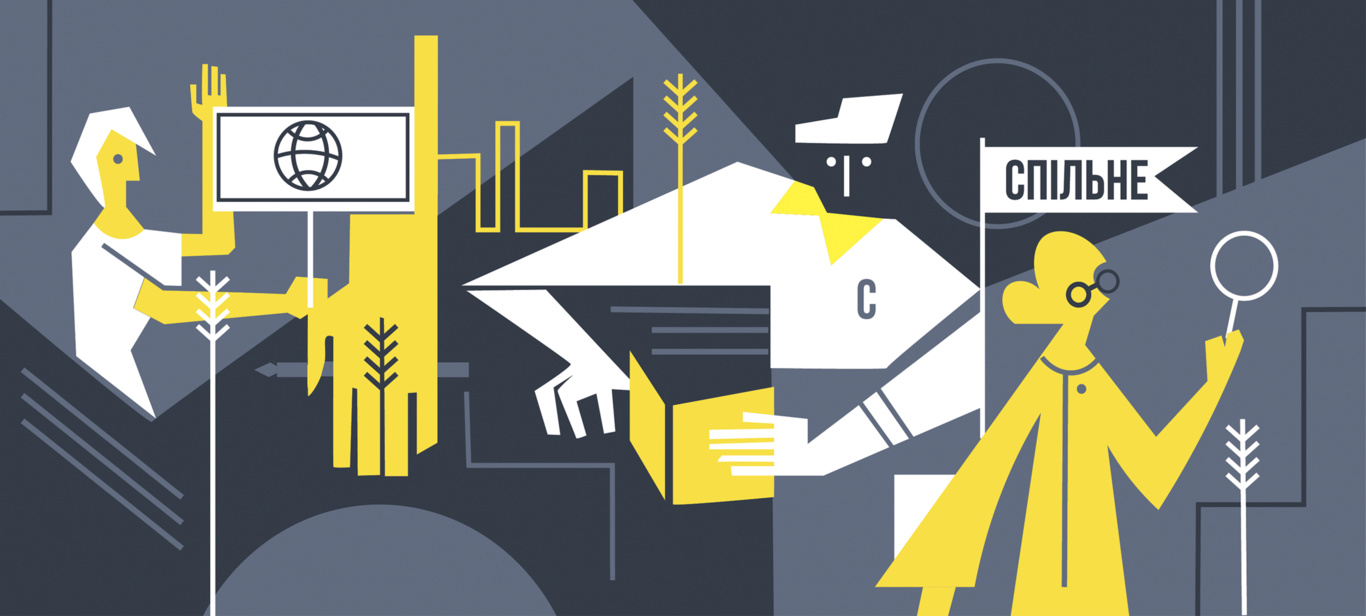One of the paradoxes of the war in Ukraine is that some of us have discovered the existence of an active left and a critical and creative thinking in Ukraine that we (including the author of these lines) have ignored for too many years. Amongst our revelations, Commons, Journal of Social Criticism, is certainly one of the most important and productive places for us to understand the situation in Ukraine — and in the world. It publishes its articles in Ukrainian, English, and Russian. Today Commons is a reference website for critical thinking on the European left. While the site deals with issues specific to Ukraine, it is open to the world. One of its recent initiatives is the “Dialogues of the peripheries”, the objective being that “resistance to the capitalist system should be a way to find alternative solutions for all countries of the global periphery. To this end, we are initiating a common independent dialogue with activists from different regions, from Latin America to East Asia.” I recently had a conversation with the editorial board of Commons.
Commons was founded in 2009. Under what circumstances, by whom, and why was it founded?
At that point, Ukraine already had a certain ecosystem of left-wing organizations, ranging from anarchists to various kinds of Marxists. Their activities included, e.g., a campaign against the new Labor Code and protests against real estate developers illegally seizing public space. There were also a number of left-wing online resources. Founders of Commons, for the most part, belonged to or sympathized with one or several of these initiatives. However, they were not satisfied with the quality of political analysis that was typical of the leftist milieu in Kyiv at that time. Many of these people were students or researchers, some already exposed to Marxist discussions and texts through Western universities, which were much more sophisticated and up to date than the texts discussed by activists in Ukraine.
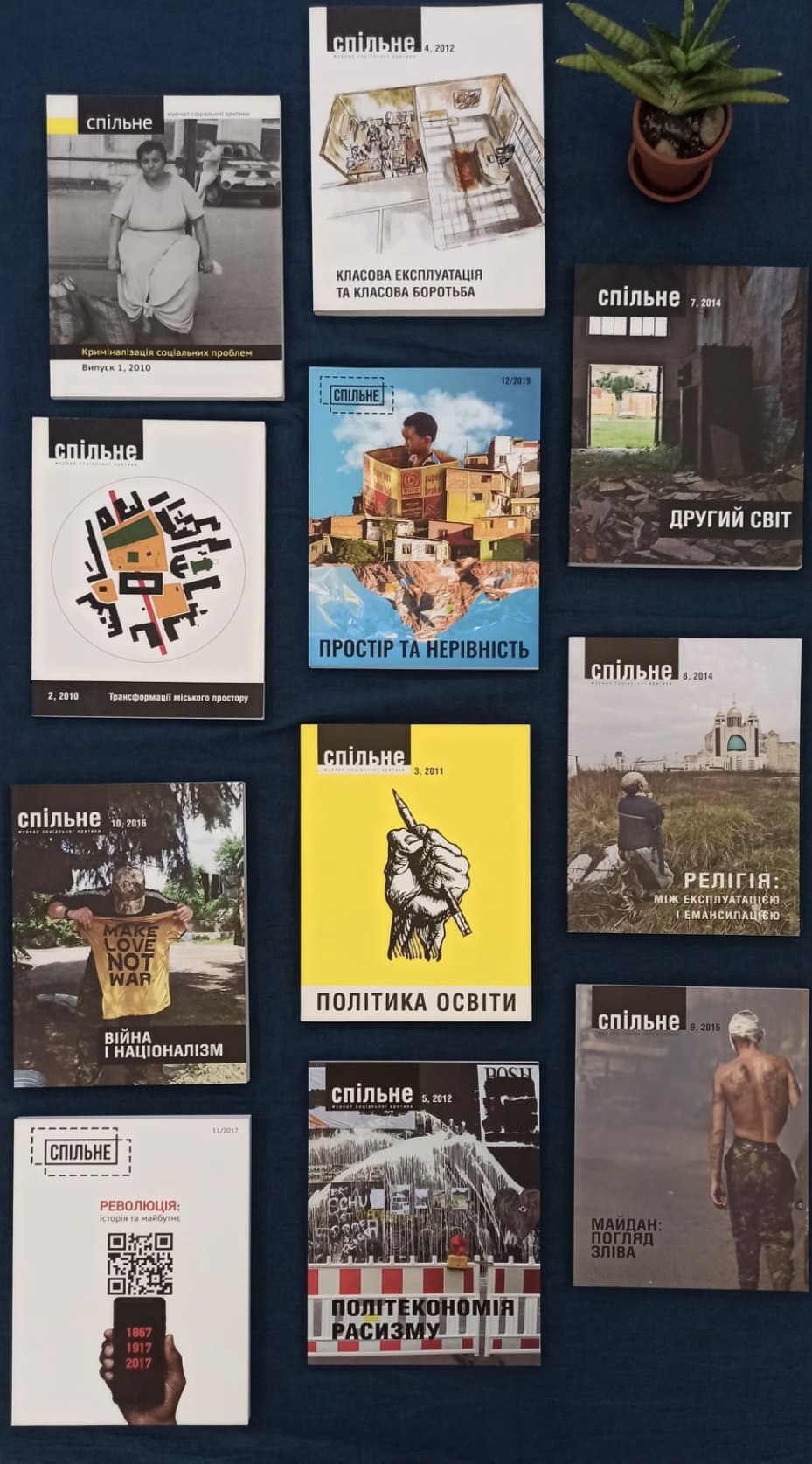 Printed issues of the Commons journal
Printed issues of the Commons journal
So, initially these people launched a mailing list that they called “leftist thought” to hold informed politically engaged discussions. Soon they decided to start a website that would popularize global socially critical thought among a wider population. First publications were almost exclusively translations. Gradually, we started producing our own texts as well, and soon we launched a paper journal. The idea behind it was to have something akin to a proper academic journal, with peer review and high intellectual standards, but independent from all academic bureaucracy. Some of these founders are still on the team; with others we have parted ways. The paper journal does not exist anymore. But the general idea is still the same: to produce and distribute high-quality, politically engaged social analysis.
More generally, in addition to denouncing the damage of the global capitalist system, it seems that you are seeking to highlight the alternatives that are being built here and now and in the more specific context of colonized societies on the periphery of the capitalist system. Is this concern an effect of the situation in Ukraine? Why?
It is clear that Ukraine is a peripheral country, and that this fact cannot be ignored in developing social analysis and political strategies. While the initial impulse behind Commons was to familiarize the post-Soviet public with Western thought, we never intended to stop at this unidirectional transmission. We learn a lot from our Western comrades, but we feel that they also have a lot to learn from peripheral locations of knowledge production. We also feel that we need an independent exchange of experiences and perspectives with other peripheral countries. Same goes for the revolution vs the “here and now” perspective: the two need to be combined, otherwise the anticapitalist rhetoric remains shallow and general, just as “practical solutions” do not lead us anywhere without a wider radical perspective.
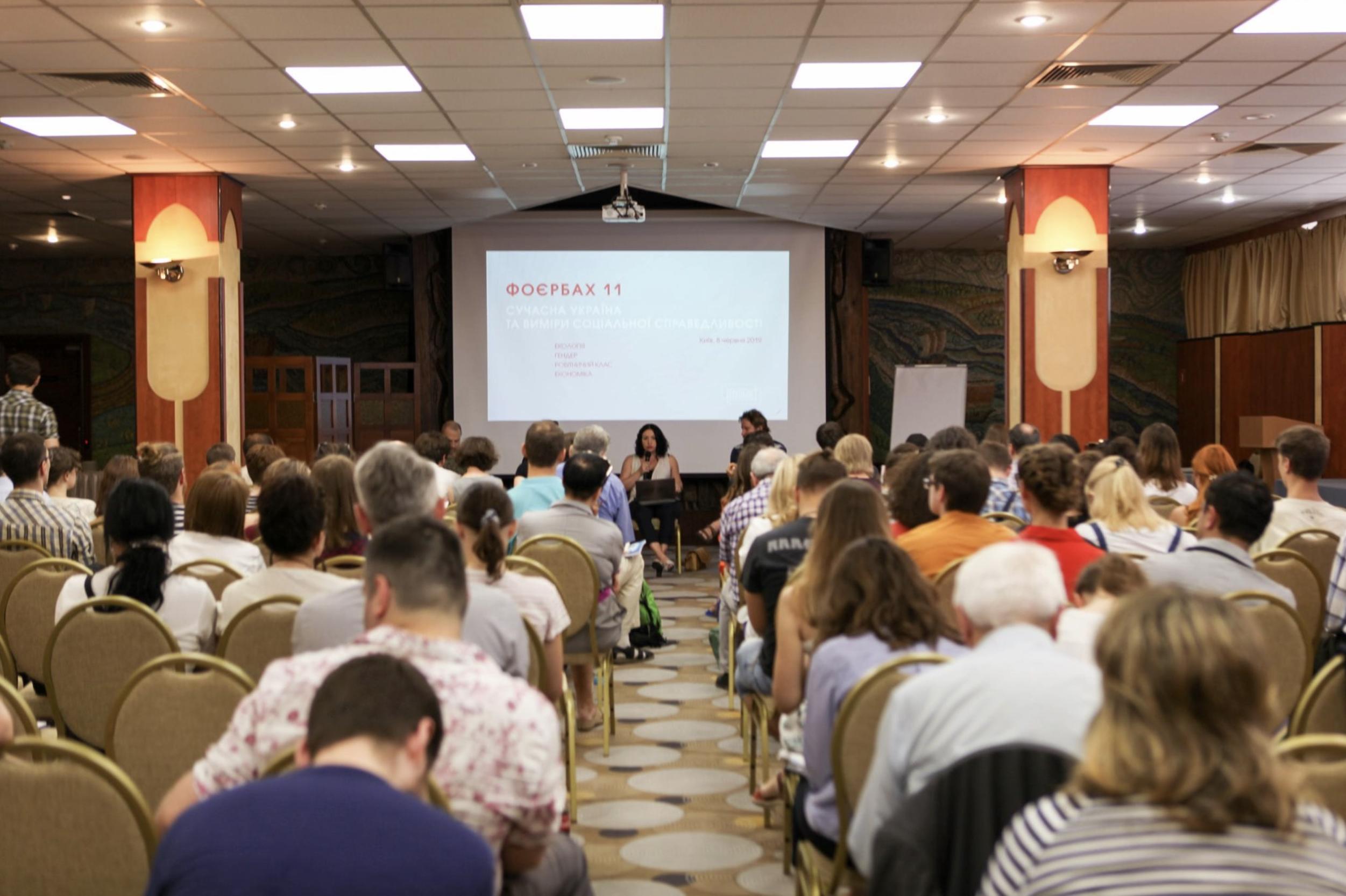
Feuerbach 11 conference, Modern Ukraine and dimensions of social justice, 2019
And so you are very interested in the situations and experiences of social movements in Latin America, Africa, Asia? This may seem paradoxical for a European country.
After the start of full-scale war, we realized that what we knew and published about peripheral countries was often written by Western left-wing authors, or those from the Global South who have long lived in the West. The same played out in the Ukrainian case — when attention suddenly focused on our society, those were often the Western people whose perspective on the Russian invasion was the loudest and often the most valued. Even if they had never dealt with the Ukrainian context before. Unfortunately, this was also true for leftist discussion, though leftists are supposed to care about hierarchies, power relations, context, and representations. At the same time, the war contributed to the emergence of new contacts with leftists from all over the world. We decided that a more direct dialogue with progressive forces in the “Global South” was needed.
Ukrainian society has been repeating the slogan “Ukraine is Europe” for a decade. The insistency with which it is being constantly repeated makes one wonder whether those who keep proclaiming it are not trying to convince themselves of something not really evident. It is of little interest to state handbook facts, according to which the European continent stretches from the Atlantic to the Urals and the Caspian Sea. In the social reality that we live in, “Europe” stands for one of the richest regions of the world, dominating much of the rest of the planet politically and economically. There are also numerous inequalities inside the imagined “Europe.” Claiming that Ukraine is a part of this prosperous and powerful bloc would be presumptuous. Hence, a reality of Ukrainian society, that it is built into global capitalist hierarchies as a periphery, cries out for materialist analysis, instead of the idealistic and sometimes racist proclamation of Ukraine being the part of “European civilization.” Europe remains of course an important point of reference, as we are anyway situated in the region and Ukrainian history and current events are deeply related with the neighboring countries. But it is useful to reflect on our place in European hierarchies and to decenter our optics and look for productive comparisons or shared experiences elsewhere, in equally peripheral places, to find our common ways of challenging the existing exploitative system of global inequalities.

Feuerbach 11 conference, After 1991: Post-Soviet trajectories, 2021
On the situation in Ukraine, many articles are published. What are the specificities of your publications on this subject? What are the main concerns of your choice of articles? What do you say that others do not?
Well, we differ from foreign left-wing publications in that we are a Ukrainian media, and from Ukrainian ones in that we are one of the few left-wing media in Ukraine. As any progressive leftists would agree — it is important to give voice to the people on the ground and, hence, we are voicing our perspective and are trying to give voice to diverse groups and experiences from Ukraine. Unlike many other media from Ukraine, we, as a left media, consider the topics of current inequalities, exploitation, and paths to a more egalitarian and just society to be the most important.
What place does Marxism have in your thinking?
This is probably a question that each member of the editorial board should answer individually. Some of us are Marxists, but not all of us, and among the journal’s co-founders and former editors there were people of various views, including anarchists. However, a materialist approach to reality is what unites all the editors.
We have translated the works of many Marxist authors, such as Perry Anderson, Étienne Balibar, Tithi Bhattacharya, Hal Draper, David Harvey, Nancy Fraser, Michael Löwy, Marcel van der Linden, Nicos Poulantzas, Beverly J. Silver, Enzo Traverso, and Erik Olin Wright to name a few. At the same time, we translated anarchist authors, such as David Graeber and Peter Gelderloos, and just progressive scholars, such as Randall Collins and Pierre Bourdieu. We also pay special attention to the intellectual legacy of Roman Rosdolsky, one of the most prominent Ukrainian Marxists.
You have edited the paper magazine Commons. Its last issue was in June 2019. Why did you stop?
It requires a lot of time and effort, and there is not much benefit from it. Though it allowed us to provide a more holistic approach to a selected topic and to engage the most active people into a leftist perspective, online publications allow us to reach out to more people and to pursue an attempt to make a more general shift in public discussion. In addition, while our issues were thematic, usually a particular topic was of interest to only a portion of the editorial board, while the rest were less involved. In the end, we are deeply appreciating that experience and some of us have a bit of nostalgic feeling toward print issues, but at some point we decided to move forward.
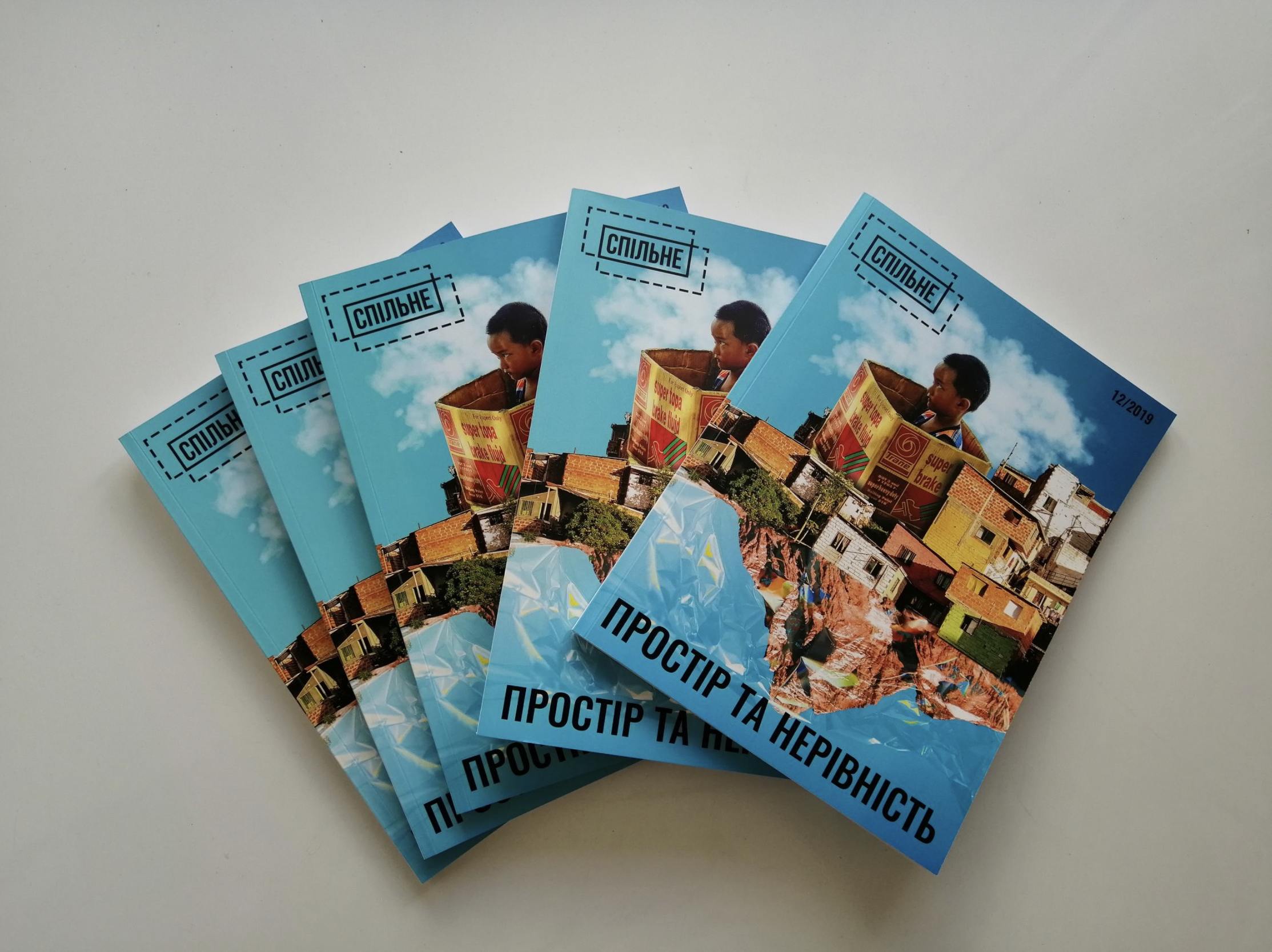
The latest issue of Commons journal
On your website you offer books for free download (for example, Who will look after the children? Kindergartens in the context of gender inequality; A future without capitalism; Cybernetics and democratic economic governance). Do you plan to publish your own books in the future?
These books (some of which are rather research reports, others edited volumes) came into being as a result of a particular interest and engagement of some of the editors leading the publication or undertaking the research. Some of them were also edited by people outside Commons, but with whom we share common ideas and visions.
We are currently preparing an important book on the results of the special project on Just Transition. It will be available in Ukrainian and adapted for an English-speaking audience.
On your website you say “The editorial board shares egalitarian and anti-capitalist views. That is why in our publications we discuss how to change society so that there is no room for exploitation, inequality and discrimination.” How is this reflected in your functioning and in your choice of articles?
Of course, our ideological perspective influences the choice of articles. We cannot say that we publish only authors who have the same ideological viewpoint as we do. Yes, most of our publications come from like-minded people. But we also sometimes publish pieces with which we agree, though the frame of the article is not necessarily leftist; nevertheless it should, of course, contain nothing contrary to our beliefs, like racism, elitist sentiments, misogyny, market-based approaches, and so on. The idea to construct a dialogue with peripheral experiences comes directly from our views. It is important for us to push forward the equal voice of women and give the perspective of workers. In our everyday work we are aware of the different and often unequal situations of editors and external people, with whom we cooperate. We are aware that some of us have full-time jobs to support their living. We take into account that some have care obligations, which have a significant impact on their working time and schedule.
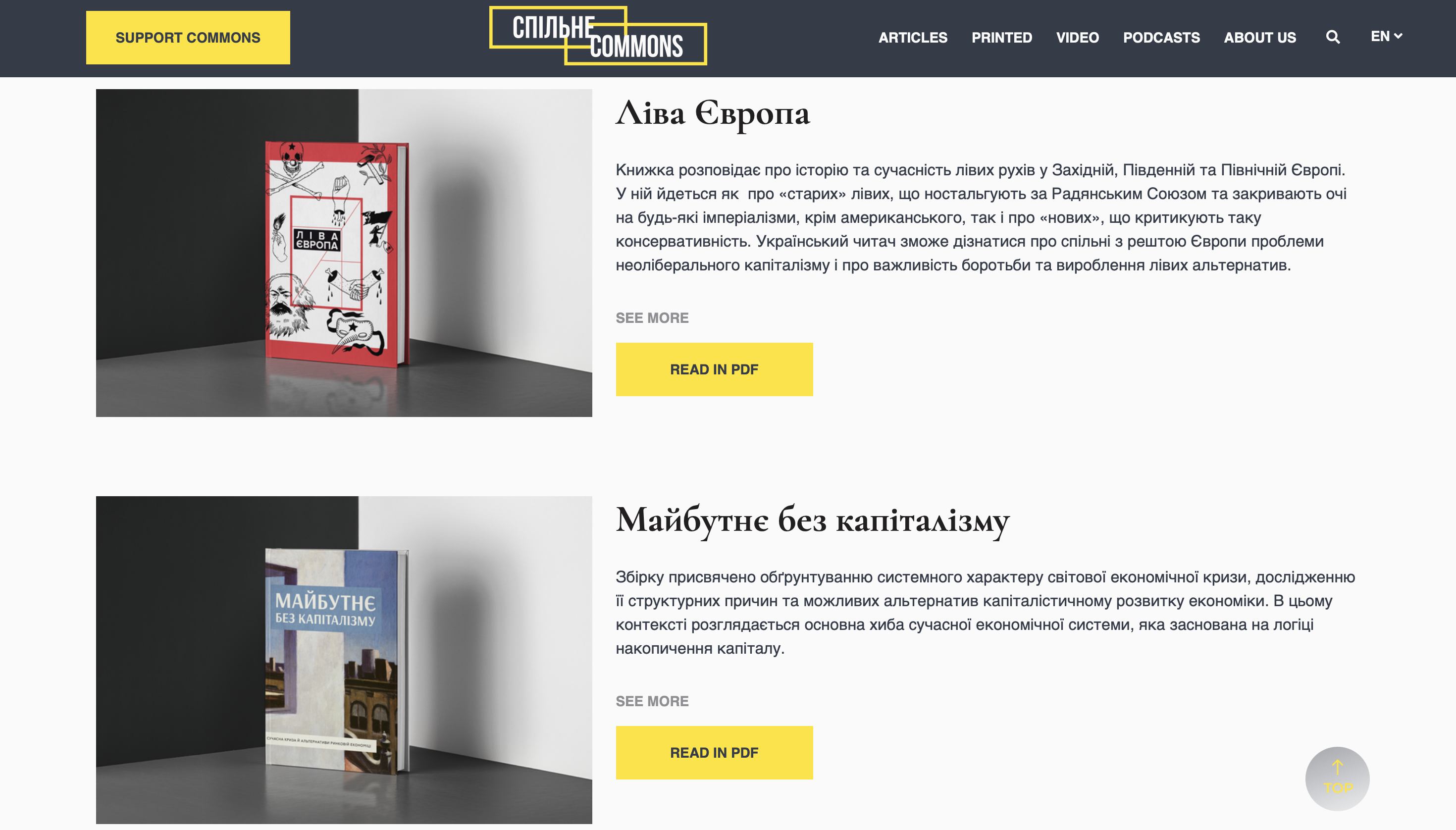
Books on the Commons website that can be downloaded for free
Since the start of the full-scale war on February 24, 2022, how have you been working and how has this changed your publishing policy?
In the first months of the invasion, we switched almost completely to an international audience, although before that we paid little attention to the English version of the site. We felt it important to engage into regional and global leftist debates about the Russian invasion, and to promote our perspective on what genuine internationalism and solidarity means in a situation like this. When the discussion about the post-war reconstruction of Ukraine started sometime in summer 2022, we considered it important to promote the idea of a just reconstruction. By the end of the previous year we had consolidated the idea of the dialogues of the peripheries, though it was under internal discussion for some months already. This makes the English-language publication continuously important for us and we are trying to translate a substantial portion of our texts and planning to do it further.
We also have built and continue building connections with different progressive media and activists from other countries and this helps to increase the variety of authors and perspectives. From a more organizational perspective, we also have to adjust a lot. The personal situations of many of our editors and authors have changed because of the full-scale invasion. Some had to relocate within Ukraine, some had to flee abroad, some went to the army, some became enforced single mothers (due to the Ukrainian government’s restriction on border mobility for men). Our work in spring 2022 was a bit chaotic as the general and personal circumstances were constantly changing. Now the situation is settled to an extent, and we work together mostly using online communication. Paradoxically, the COVID-19 pandemic had prepared us for this from a technical and practical point of view.
Do you have relationships with other websites in Europe or internationally?
We have numerous relationships with different media, mostly in Europe, but also in the US, Latin America, etc. We are members of the East European networks ELMO and cooperate with others from time to time. We have far fewer contacts with media from similarly peripheral countries, outside Eastern Europe or Latin America. But we also have some plans and ideas, which we are now working on together with other people in order to facilitate communication and cooperation worldwide.
Since the full-scale invasion began, we have seen a doubling in the number of websites that have translated, reprinted, or linked to our publications in their articles. In one year, this number has grown to almost 2,000 sites worldwide. And the number of active backlinks to our publications rose five times to more than 150,000.
Some of the media have gotten our permission and published translations of our articles. But the majority of them do it themselves. And we welcome this kind of distribution.
So our articles, especially on the Russian-Ukrainian war, which we started to publish actively in English, have started to influence the political discussion in other countries around the world.
How many readers do you have? How many people visit your website?
We have our own stable core audience. Overall, the site is read by about 30,000 readers a month. About half of them are foreign audiences, which have doubled since the invasion began. We also spread our ideas and values through social media, using shorter and more accessible formats. In such a way we are aiming to reach younger people, creating highlights of articles in the Instagram account and on Twitter, for example.
Links to interviews in other languages:
English
– NewPolitics;
– Europe Solidaire Sans Frontières;
French
– Entre les lignes entre les mots;
– Europe Solidaire Sans Frontières;
Spanish
– Vientosur.
Spanish (Uruguay)
Dutch
– Grenzeloos.
Dutch in Flanders
Italian
Portuguese (Brazil)
– Cspconlutas.
Danish
– Socialistisk Arbejderpolitik (SAP).
Greek
– E LA LIBERTA.
Norwegian
Chinese
Talked: Patrick Le Tréhondat
Cover: Kateryna Gritseva
